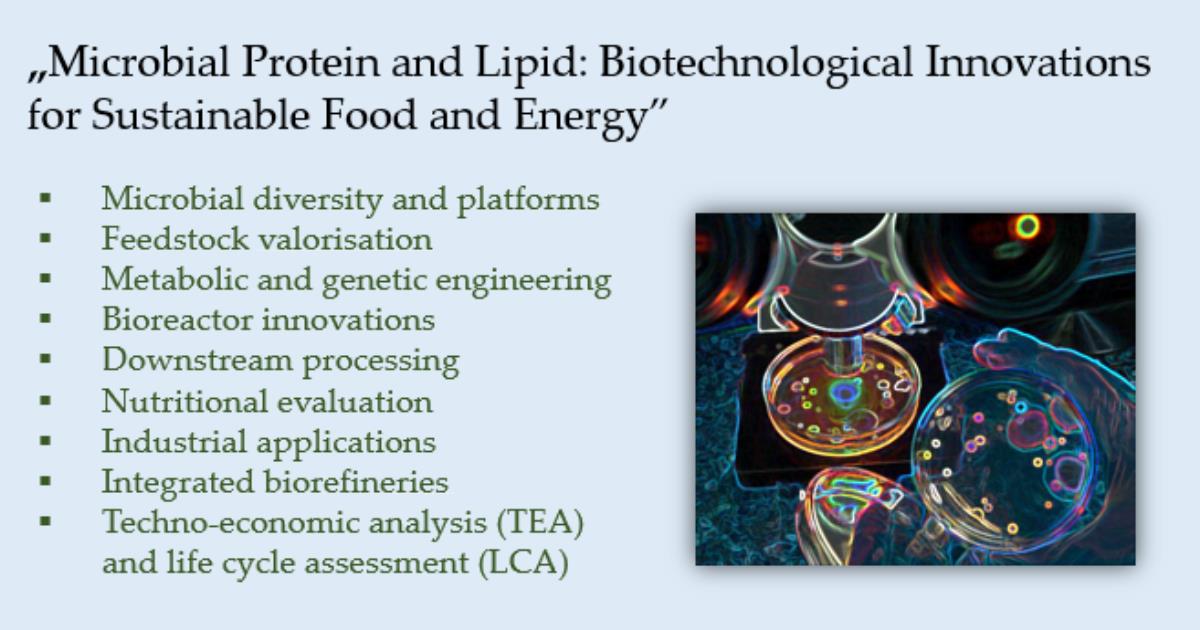Microbial Protein and Lipid: Biotechnological Innovations for Sustainable Food and Energy
A special issue of Applied Sciences (ISSN 2076-3417). This special issue belongs to the section "Food Science and Technology".
Deadline for manuscript submissions: 30 June 2026 | Viewed by 114

Special Issue Editor
Interests: non-conventional yeast; Rhodotorula; yeast lipids biosynthesis; SCO; exopolysaccharides biosynthesis; biodiesel; SCP; waste valorization; bioreactors
Special Issues, Collections and Topics in MDPI journals
Special Issue Information
Dear Colleagues,
The increasing demand for sustainable food and energy sources has driven the development of microbial biotechnologies capable of converting renewable and waste-derived substrates into high-value products. Among these, microbial protein and microbial lipids have emerged as promising alternatives to conventional resources. Recent advances in strain engineering, process optimization, and formulation have significantly improved yields and product quality. Equally critical are technological solutions in bioreactor design, including improved aeration, mixing, and scale-up strategies, which enhance productivity and process stability. Innovations in downstream processing, ranging from cell disruption and protein purification to sustainable lipid extraction and fractionation, further determine economic feasibility and environmental impact.
This Special Issue will highlight recent progress in microbial platforms, feedstock utilization, process innovations, and techno-economic perspectives that advance SCP and SCO toward industrial application in sustainable nutrition and energy. We request studies covering applied and technological aspects, including but not limited to the following:
- Microbial diversity and platforms: bacteria, yeasts, filamentous fungi, and microalgae for SCP and SCO production;
- Feedstock valorization: utilization of agricultural residues, industrial by-products, municipal wastes, and lignocellulosic substrates;
- Bioreactor innovations: novel reactor configurations, aeration/mixing strategies, scale-up solutions, continuous vs. fed-batch systems, and advanced process control;
- Metabolic and genetic engineering: strategies to enhance yield, amino acid balance, and lipid accumulation;
- Downstream processing: cell disruption, protein purification, nucleic acid reduction, lipid extraction and fractionation, and solvent-free and sustainable separation methods;
- Nutritional evaluation: amino acid composition, protein digestibility, fatty acid profile, and functional properties for food and feed applications;
- Industrial applications: microbial oils for biodiesel and oleochemical sectors, microbial proteins for human food, aquaculture, and animal feed;
- Integrated biorefineries: coupling SCP and SCO production with valorization of side-streams and co-products;
- Techno-economic analysis (TEA) and life cycle assessment (LCA) from sustainability, scalability, and circular bioeconomy perspectives.
I look forward to receiving your contributions.
Dr. Iwona Gientka
Guest Editor
Manuscript Submission Information
Manuscripts should be submitted online at www.mdpi.com by registering and logging in to this website. Once you are registered, click here to go to the submission form. Manuscripts can be submitted until the deadline. All submissions that pass pre-check are peer-reviewed. Accepted papers will be published continuously in the journal (as soon as accepted) and will be listed together on the special issue website. Research articles, review articles as well as short communications are invited. For planned papers, a title and short abstract (about 250 words) can be sent to the Editorial Office for assessment.
Submitted manuscripts should not have been published previously, nor be under consideration for publication elsewhere (except conference proceedings papers). All manuscripts are thoroughly refereed through a single-blind peer-review process. A guide for authors and other relevant information for submission of manuscripts is available on the Instructions for Authors page. Applied Sciences is an international peer-reviewed open access semimonthly journal published by MDPI.
Please visit the Instructions for Authors page before submitting a manuscript. The Article Processing Charge (APC) for publication in this open access journal is 2400 CHF (Swiss Francs). Submitted papers should be well formatted and use good English. Authors may use MDPI's English editing service prior to publication or during author revisions.
Keywords
- single cell protein
- single cell oils
- amino acid composition
- fatty acid profile
- waste valorization
- sustainable feedstocks
- bioprocess engineering
- food and feed applications
- biodiesel production
- circular bioeconomy
Benefits of Publishing in a Special Issue
- Ease of navigation: Grouping papers by topic helps scholars navigate broad scope journals more efficiently.
- Greater discoverability: Special Issues support the reach and impact of scientific research. Articles in Special Issues are more discoverable and cited more frequently.
- Expansion of research network: Special Issues facilitate connections among authors, fostering scientific collaborations.
- External promotion: Articles in Special Issues are often promoted through the journal's social media, increasing their visibility.
- Reprint: MDPI Books provides the opportunity to republish successful Special Issues in book format, both online and in print.
Further information on MDPI's Special Issue policies can be found here.





